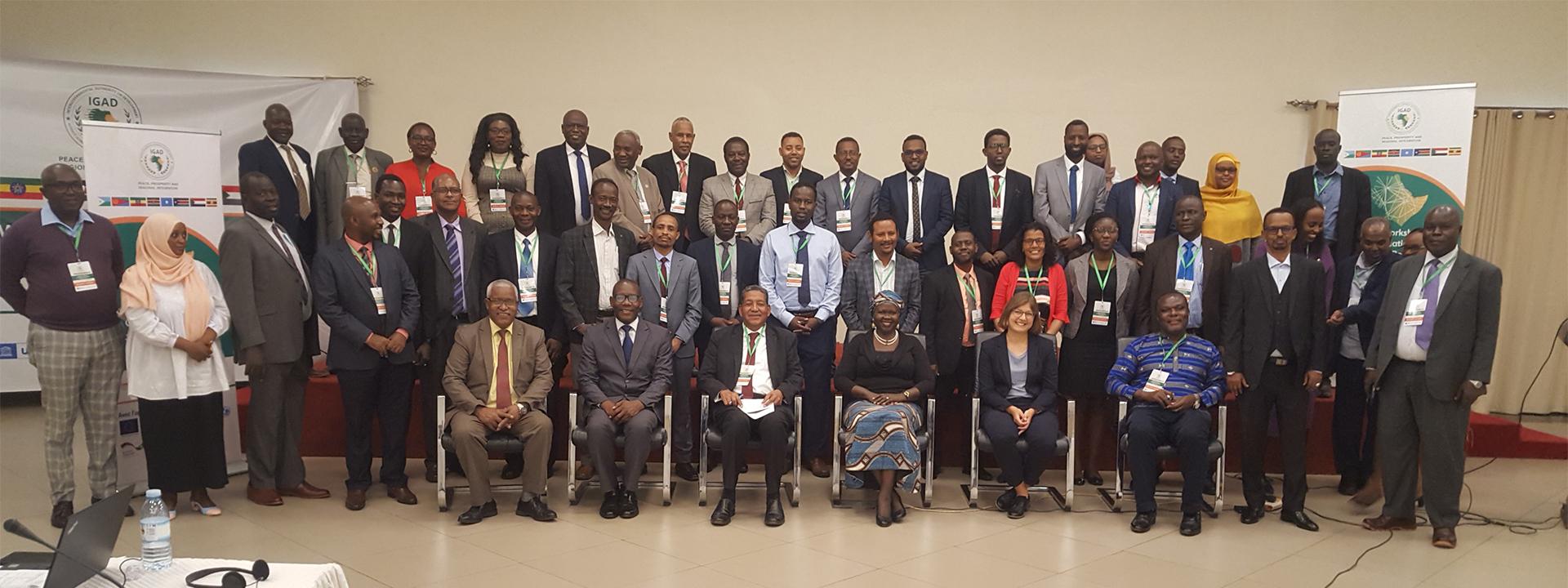October 19, 2022 (ENTEBBE, Uganda): The Intergovernmental Authority on Development (IGAD) convenes regional Workshop for the Validation of the IGAD Regional Qualifications Framework, today, in Entebbe, Uganda.
The Key Purpose of the three days regional validation workshop is to review and finalize the draft of the comprehensive IGAD Education Qualification Framework, before submission to the member states for their endorsement.
Speaking on behalf of the Executive Secretary of IGAD, Dr. Workneh Gebeyehu, and Madam Fathia Alwan, the Director for Social Development of IGAD, Lucy Daxbacher, the IGAD Head of Mission to Ugandawelcomed the participants and disclosed that the IGAD Qualification Framework will expand the opportunities for the mobility of the IGAD citizens while advancing the right to access quality education for some of the most marginalized individuals in our communities.
“We have made great strides towards developing the IGADQF and have undertaken numerous regional and national engagements to create a comprehensive qualifications framework; And We believe your insights, expertise, and collaboration will enrich this process and strengthen the final IGAD Regional Qualifications Framework. “ She added
On behalf of the Uganda State Minister of Education and Sports, First Lady, Maama Janet Kataha Museveni and as a host country, Joseph Kikomeko, Commissioner TVET Trainers’ Training, Research and Innovation, Ministry of Education and Sports, explained that Uganda hosts more that 1.5 million refugees who need support to further education, and also to be integrated into the world of work.
“A regional Qualification Framework is a critical project which should be embraced by everyone. It will support mobility and comparability of qualifications within and across borders.” Mr. Joseph Kikomeko, stressed.
Milena Adnyanata, GIZ Advisor in the Strengthening IGAD’s Migration Policy Implementation (SIMPI) Project said that on behalf of the government of Germany, the Strengthening IGADs Migration Policy Implementation Project (SIMPI) backed the elaboration of the IGADQF through a consultancy and supporting IGADs regional expert meetings.
“I am delighted to see that we already have a sound draft document thanks to the expertise of IGAD and the consultant Prof. Mukhwana.” She said
During the opening ceremony of the Regional Workshop Dr. Kebede Kassa, Senior Program Coordinator for Education, Science, Technology and Innovation, Health and Social Development Division, IGAD, emphasized that IGAD is pleased to convene this regional workshop to validate the IGADQF, which will contribute to the finalization of the IGADQF and validate critical components of the draft.
“The IGADQF will provide member states with the support to build and strengthen mechanisms to recognize and assess equivalency of educational standards/ qualifications at national, regional and international levels.” Dr. Kebede stated.
The Republic of Sudan Chaired person also took the floor and gave his remarks during the opening ceremony.
The validation workshop involved participatory, engaging activities and welcomes everyone to share, reflect and express their ideas, including, sessions divided into presentations, plenary sessions, group discussions and group exercises.
At the end of the regional workshop the expected outcomes resulted in draft IGADQF presented, reviewed, validated and implementation Roadmap presented and elaborated in preparation for adoption at the upcoming IGAD Ministerial Conference on Education planned in December 2022 and, finally, selected participants commit to leading the IGADQF Implementation Roadmap and the way forward.
The regional validation brought together participants from IGAD Member State Experts (Ministries of Education, Labour and Foreign Affairs), Core Group members (UNHCR, GIZ and UNESCO), and relevant stakeholders in the area of qualifications and harmonization and IGAD secretariat.
Budget for the various activities funded from the IGAD.
In 2017, IGAD ministers in charge of education adopted the Djibouti Declaration, which laid out the key priority areas for equitable, inclusive and quality education for all, with particular emphasis on education for refugees, returnees and host communities.

